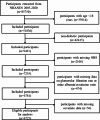Dietary and lifestyle oxidative balance score was negatively associated with the risk of diabetic kidney disease: NHANES 2005-2020
- PMID: 39731593
- PMCID: PMC12141365
- DOI: 10.1007/s00592-024-02399-7
Dietary and lifestyle oxidative balance score was negatively associated with the risk of diabetic kidney disease: NHANES 2005-2020
Abstract
Aims: There is a potential association between oxidative stress and the development of diabetic kidney disease (DKD). The Oxidative Balance Score (OBS), derived from dietary and lifestyle factors, acts as a comprehensive marker of oxidative stress. Research examining the relationship between OBS and DKD is scarce. This study aims to evaluate the association between OBS and the risk of DKD among U.S. adults.
Methods: This study enrolled 6,725 eligible participants from the U.S. population through the National Health and Nutrition Examination Survey (2005-2020). Patients with DKD were defined as those with diabetes who had a urinary albumin-to-creatinine ratio ≥ 30 mg/g and/or an estimated glomerular filtration rate < 60 mL/min/1.73 m². The OBS consists of 20 composite scores derived from dietary and lifestyle factors. To assess the potential relationship between OBS and DKD, weighted logistic regression and restricted cubic spline statistical approaches were employed.
Results: The risk of DKD was inversely correlated with OBS, dietary OBS, and lifestyle OBS (p < 0.05). Compared to the lowest quartile of OBS, the adjusted odds ratios (OR) for OBS, lifestyle OBS and dietary OBS, and DKD in the highest quartile were 0.58 (95% CI: 0.48-0.70), 0.64 (95% CI: 0.51-0.81), and 0.57 (95% CI: 0.46-0.70), respectively. A substantial nonlinear relationship between lifestyle OBS and DKD was identified using the RCS curve (p for nonlinearity = 0.0081), which appeared as an inverted 'L' shape. Using the two-piecewise logistic regression model, a turning point in lifestyle OBS was identified at a score of 3 (p < 0.001).
Conclusions: Among the American population, OBS and DKD are significantly negatively correlated, suggesting that maintaining a higher OBS may reduce the risk of developing DKD.
Keywords: DKD; Dietary; Lifestyle; NHANES; Oxidative balance score.
© 2024. The Author(s).
Conflict of interest statement
Declarations. Competing interests: None. Ethical approval: The National Health and Nutrition Examination Survey (NHANES) is a publicly available database and approved by the National Center for Health Statistics institutional review board. All participants provide written informed consent when they did the national survey in the United States. Ethical review and approval were waived for this study since secondary analysis did not require additional institutional review board approval. Consent for publication: Not applicable.
Figures


References
-
- Rayego-Mateos S, Rodrigues-Diez RR, Fernandez-Fernandez B et al (2023) Targeting inflammation to treat diabetic kidney disease: the road to 2030. Kidney Int 103(2):282–296 - PubMed
-
- Aramouni K, Assaf R, Shaito A et al (2023) Biochemical and cellular basis of oxidative stress: implications for disease onset. J Cell Physiol 238(9):1951–1963 - PubMed
-
- Brownlee M (2001) Biochemistry and molecular cell biology of diabetic complications. Nature 414(6865):813–820 - PubMed
MeSH terms
Grants and funding
LinkOut - more resources
Full Text Sources
Medical

